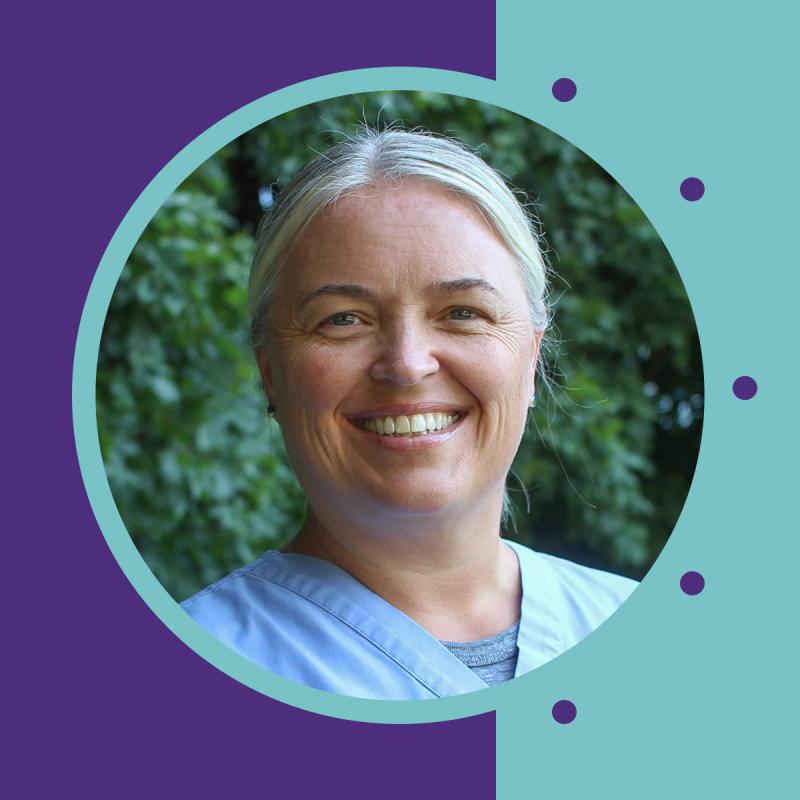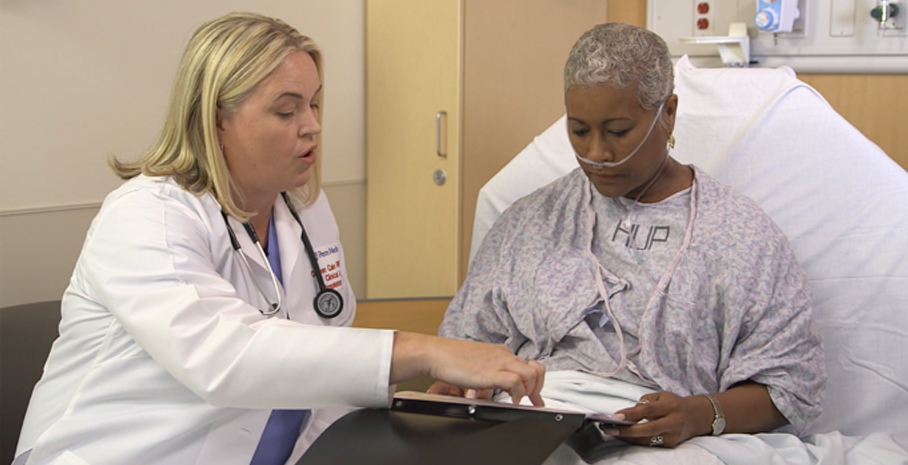Spotlight on: Colleen Cain

COPD Educator
Clinical Lead Respiratory Therapist
COPD Educator and Clinical Lead Respiratory Therapist, Hospital of the University of Pennsylvania
Colleen Cain is an expert in helping people breathe easier – specifically, patients with chronic obstructive pulmonary disease, or COPD, a set of conditions where airway blockage can cause difficulty breathing. COPD is a leading cause of death in the United States, a major source of hospital readmissions, and, as Cain found, an area of care ripe for innovation.
Cain has been a respiratory therapist at the Hospital of the University of Pennsylvania (HUP) for 25 years. During her first two decades, she traveled throughout the hospital and assisted different types of patients with breathing issues. Then, in 2017, Cain was promoted to clinical lead respiratory therapist on the pulmonary step-down floor – an area where pulmonology patients are assessed before discharge from intensive care.
"That gave me more time to spend with pulmonary [patients] and see the ongoing issues that some COPD patients have," says Cain. Her clinical team met weekly to brainstorm what more could be done to improve care and reduce readmissions. "We wanted to identify high-risk patients, give them better education, and have an interdisciplinary role with Case Management, Pharmacy, and other care teams to ensure that patients were leaving here with everything they needed."
 Then opportunity knocked in the form of the Innovation Accelerator Program. In collaboration with the Center for Health Care Innovation, Cain and pulmonologists Vivek Ahya, MD, and Michael Sims, MD, MSCE, created Breathe Better Together (BBT), a hospital-to-home transition program for COPD patients that offers personalized home-based interventions after discharge.
Then opportunity knocked in the form of the Innovation Accelerator Program. In collaboration with the Center for Health Care Innovation, Cain and pulmonologists Vivek Ahya, MD, and Michael Sims, MD, MSCE, created Breathe Better Together (BBT), a hospital-to-home transition program for COPD patients that offers personalized home-based interventions after discharge.
The program leverages a customized dashboard to identify high-risk hospitalized patients with COPD and an automated text messaging program to detect early symptoms of clinical decline in the outpatient setting. If a patient's condition worsens, respiratory therapists reach out to conduct virtual evaluations, provide guidance and reassurance, and, if necessary, rapidly escalate unresolved issues to the on-call pulmonologist and/or arrange for a home-based visit. Dubbed Cavalry, the home care program developed for BBT patients was so successful that it is now being implemented across the health system.
Cain has been indispensable to BBT in many ways, identifying COPD patients as they are admitted, recommending which patients be enrolled in the program, providing support to patients both during their hospital stay and after discharge, and ensuring that patients get the medications they need by introducing manufacturer and special programs that lower costs.
"I was that person the patient was able to relate to," she says. "While they were in the hospital, we did one-on-one education and talked about issues at home that could cause them to come back in – equipment issues, personal issues. [I taught] patients breathing techniques to help them relieve their shortness of breath…. A lot of the patients don't have a specialist or pulmonary doctor, and they need a COPD educator to come in and tell them about the disease, teach them how to do inhalers the right way, about oxygen at home, and things like that."
"Colleen is constantly thinking outside the box to come up with innovative and creative ways to positively impact and improve our patients’ care and their quality of life.” –Michael Frazer
The program expanded to Penn Presbyterian Medical Center (PPMC) thanks to a grant from Independence Blue Cross and trainings led by Cain, and to Lancaster General Health shortly after that. However, because of staffing issues, BBT is currently on hiatus at HUP and PPMC.
"COVID changed things for us, unfortunately. But we learned a lot. And I hope we're able to get back on track because we did make a difference," she says.
Setbacks are common in innovation, but Cain takes it all in stride. "I love my job, as crazy as it is," she says. She carries that positivity across her workday as she treats pulmonology patients, teaches about COPD, and advises clinicians throughout the hospital. "I like being that person that's available to think differently with managing some of these patients."
Cain hopes to regroup with the BBT team this fall to restart the program, and she even has some further improvements in mind.
"Colleen is constantly thinking outside the box to come up with innovative and creative ways to positively impact and improve our patient's care and quality of life, both while in the hospital and after discharge," says Michael Frazer, RRT, CPFT, clinical director of respiratory therapy and pulmonary diagnostics at HUP. "In the 25 years I've known Colleen, I've never seen a challenge she couldn't overcome."